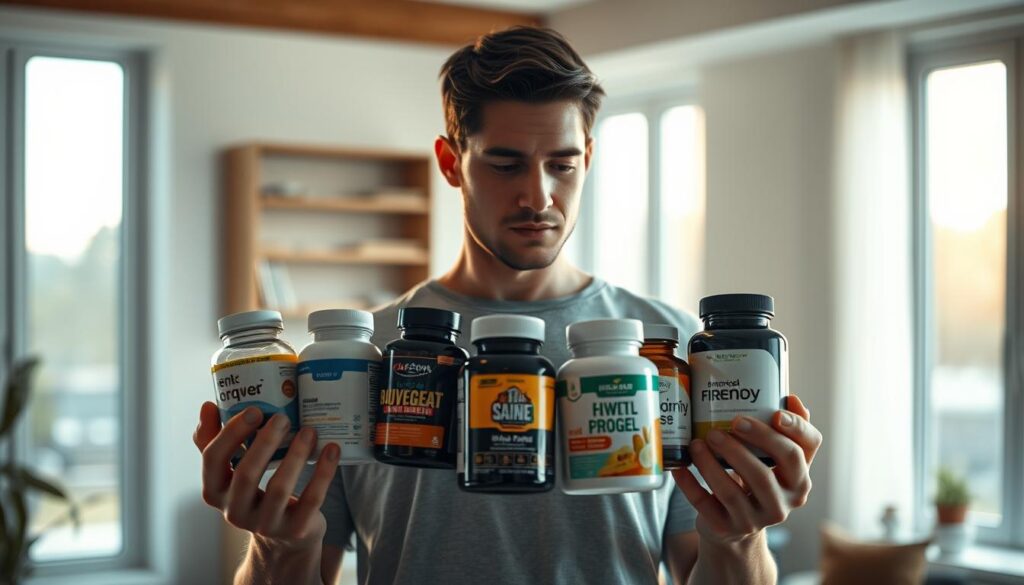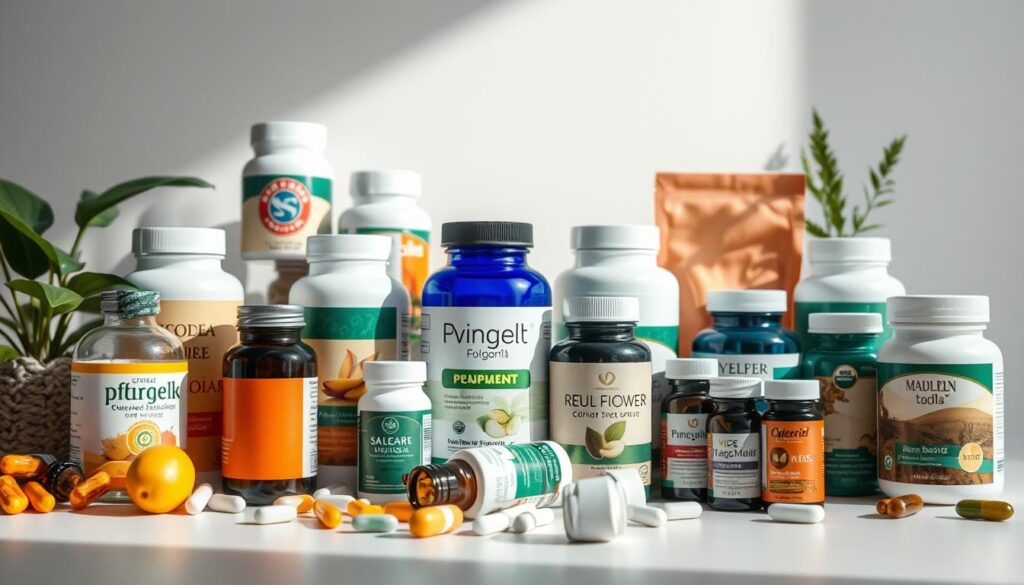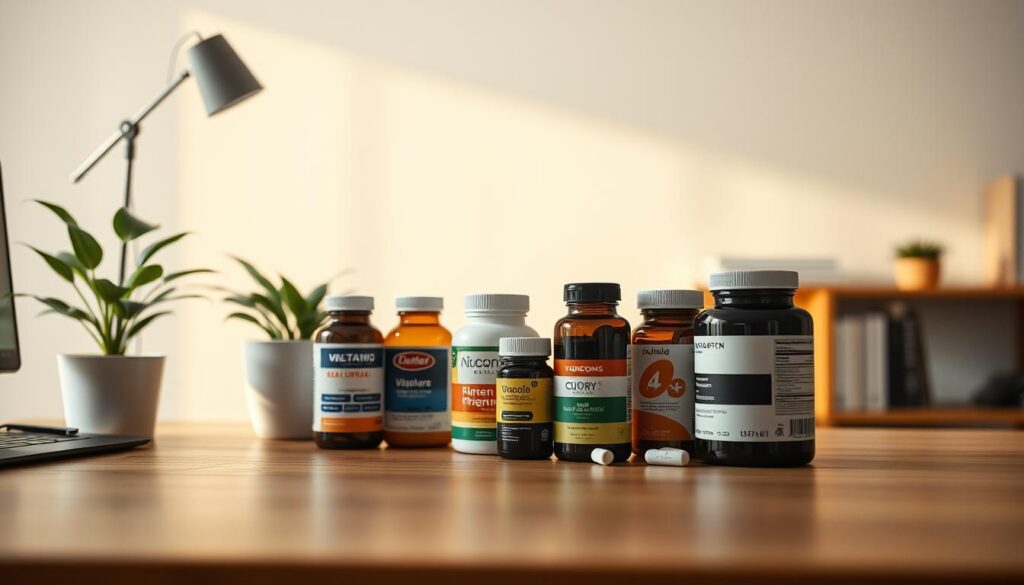Have you ever wondered why some people love dietary supplements? Others think they’re not needed. Health and wellness can feel too much to handle. This guide will help you choose the right supplements for you.
With not many rules for supplements, taking care of your health is key. Let’s find out how to pick supplements smartly.
- Unravel the complexities of dietary supplements.
- Understand the importance of prioritizing whole foods over pills.
- Learn scenarios when supplements could enhance your health.
- Discover effective strategies for selecting supplements wisely.
- Recognize common types of supplements and their benefits.
- Identify reliable sources and tips for safe supplement purchasing.
Understanding Dietary Supplements
Dietary supplements help boost your daily nutrition. They can have vitamins, minerals, herbs, and amino acids. You can find them in capsules, powders, and gummies.
While supplements are good, they shouldn’t replace meals. Knowing what supplements do is key to making smart choices for your health.
Some people take supplements to fill nutrition gaps. Others use them for specific health needs. Knowing about these products helps you use them right and safely.
The Importance of Food First in Nutritional Health

Eating whole foods is better than taking supplements. A diet full of fruits, veggies, grains, and proteins gives you important vitamins and minerals. These nutrients work together better than supplements can.
People who eat nutrient-rich foods are healthier than those who only take supplements. Eating different foods in your meals gives you important nutrients. It also gives you special health helpers found in whole foods.
Supplements are okay, but they shouldn’t be all you eat. Relying only on supplements can cause nutrient gaps. To stay healthy, eat a variety of foods to get all the nutrients you need.
When Might Supplements Be Beneficial?

Knowing when to use supplements can really help your health. Some life stages and conditions need extra nutrients. For example, pregnant and breastfeeding women need more vitamins and minerals.
Some groups might not get enough nutrients from food. Vegans need vitamin D, iron, and B12 because they’re in animal products. Seniors might not absorb nutrients well, leading to health issues.
Medical problems can make it hard to get nutrients. People with celiac or Crohn’s disease might need supplements. With doctor advice, supplements can fill nutritional gaps.
Decoding the Supplement Aisle: How to Choose Wisely

Walking down the supplement aisle can be tough. Learning how to pick the right supplements is key. Begin by reading supplement labels. They tell you what’s in the product and what it promises.
When looking at a supplement, notice the claims on the label:
- Nutrient content claims: These show the amount of certain nutrients in the supplement.
- Health claims: These say the supplement might help your health.
- Structure/function claims: These explain how the supplement might work in your body.
Remember, not all claims are backed by strong research. Always check the ingredients listed. Look for quality seals that mean third-party testing.
Your health goals help pick the right supplements. If you have special needs or diets, get advice from trusted sources. Be careful of ads that promise too much. Not all products deliver what they say.
Common Types of Supplements and Their Uses

Learning about common supplements can help you stay healthy. There are many types, each with its own purpose. Let’s look at some of these supplements and how they can help you.
Multivitamins are very popular. They give you lots of important nutrients. This is great for people who can’t get enough from food.
Herbal supplements are also interesting. They include things like echinacea and ginseng. These have been used for a long time to help your body and mind.
Amino acids help build muscles and recover from workouts. They are good for athletes or anyone who wants to keep their muscles strong.
Essential fatty acids, like Omega-3s, are good for your heart and brain. Taking these can help your heart and might even lower inflammation.
Knowing about these supplements helps you choose the right ones for you. Each type is good for different people. This way, you can pick what’s best for your health and life.
Expert Advice on Supplements

When thinking about supplements, getting the right info is key. Registered dietitians and health care providers give advice that fits you. They help pick the best supplements for your health.
Talking to your health care provider is important. They make sure supplements won’t harm you or your health plan. Their advice helps you make safe choices for your health.
How to Choose the Right Supplements for You
Choosing the right supplements starts with knowing your health. Look at your health conditions and what you’re missing in your diet. Everyone’s needs are different because of their lifestyle, age, and diet.
Think about your activity level, diet, and health goals. This helps you pick the right supplements for you. Talking to a healthcare professional can give you advice just for you.
Some people, like the elderly or those with chronic illnesses, need special supplements. It’s key to balance supplements with whole foods and good nutrition.
Supplement Selection Tips: What to Look For

Choosing quality supplements can feel overwhelming. There are so many options out there. Start by looking for certifications from trusted groups like NSF International or the U.S. Pharmacopeia (USP). These show the product has been tested for safety and accuracy.
Look closely at the ingredient list. Make sure it’s clear and doesn’t have strange ingredients. This helps you find supplements that meet your health needs. Also, check the package labeling for dosage, how to use it, and any allergens.
Watch out for claims that seem too good to be true. If a product promises amazing results that sound too good, it’s best to avoid it. Quality supplements should have realistic goals based on real science. Trust your gut when making choices to keep your health in mind.
Supplement Buying Guide: Where to Shop Safely

When looking for supplements, it’s key to know where to buy them. This can greatly affect your health. Always choose places that check their products well to ensure they are safe and good quality.
Here are some tips for a good supplement buying guide:
- Local Health Stores: Check out health food stores or pharmacies near you. The staff can give great advice and suggest good brands.
- Online Retailers: If you like shopping online, pick sites that focus on health supplements. Look for sites with easy return policies and customer feedback.
- Manufacturer Websites: Buying from the makers of supplements can be a good choice. It helps make sure you get the real deal.
- Seek Out Certifications: Look for products with seals from third-party testers. This means what’s in the bottle matches what’s on the label.
It’s important to watch out for fake products. Don’t buy from street sellers or unknown online shops. Your health is worth it, so always choose safe places to buy supplements.
Potential Risks of Taking Supplements

Supplements can help your health, but knowing the risks of supplements is key. Not all supplements work the same for everyone. Taking too much of certain vitamins and minerals can be harmful.
Water-soluble vitamins like B and C leave your body easily. But vitamins A, D, E, and K can build up to dangerous levels. This is because they are fat-soluble.
Common supplement side effects include nausea, headaches, and stomach problems. These can happen with both herbal and synthetic supplements. Always talk to a doctor before starting new supplements.
This talk can help avoid bad interactions with medicines you’re already taking. It can also lower risks.
Stick to the dosages on the labels. Taking more can lead to serious problems. Being careful with supplements helps you enjoy their benefits safely.
The Role of Third-Party Testing in Supplement Quality

When picking supplements, knowing about third-party testing is key. These tests check if supplements are safe, work well, and have what they say they do. Groups like ConsumerLab, NSF International, and U.S. Pharmacopeia help make sure supplements are good.
These groups have high standards. They do deep tests to check if products are right. Here’s why third-party testing is important:
- Trustworthiness: Products with third-party checks are safer and work better.
- Transparency: These tests show if what’s on the label matches what’s inside.
- Industry Standards: Certifications mean products follow strict quality rules.
Choosing supplements with third-party checks helps you make smart choices for your health. When you’re shopping, look for these signs. They show the product is safe and reliable.
What to Avoid When Choosing Supplements
Choosing the right supplements can be tough. There are so many options out there. Be careful of fake supplements that promise too much. They often make claims that aren’t backed by science.
Also, watch out for supplement pitfalls. If a supplement doesn’t tell you what’s in it, don’t buy it. Good brands share all the details about their products.
Stay away from poor-quality dietary supplements sold by multi-level marketing. These products might not be safe or work well. Always choose supplements from trusted makers.
When it comes to supplements, making smart choices is key. These products help improve your health but should not replace food. Always learn more and talk to your doctor to stay healthy.
Using supplements wisely means adding them to your life in a smart way. It’s about knowing what your body needs and keeping your diet balanced. Supplements should help your good habits, not hurt them.
Seeing supplements as part of your health plan is a great step. It helps you take care of your body in a smart way. Your effort to learn about supplements will make you healthier and happier.

